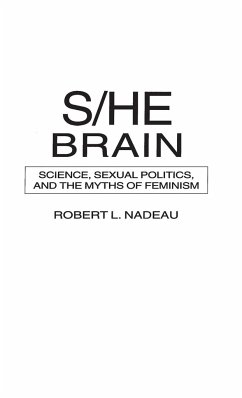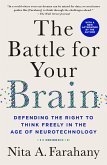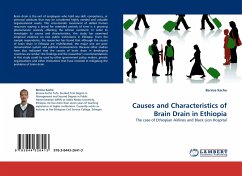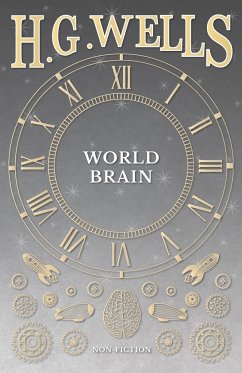In this book, Nadeau argues that, far from bringing about an armistice in the war between the sexes, the "gender/sex" construction has escalated the conflict. His intent in "S/He Brain" is to show, first, that the "gender/sex" construction is not in accord with biological reality and, second, that an improved understanding of the relationship between sex and gender could enlarge the bases for meaningful dialogue and lead to new standards of sexual equality.
During the 1960s, Margaret Mead's argument that gender identity is a product of learning in particular cultural contexts was incorporated into the sex/gender system in feminist theory. In this system, sex refers to physiological differences in the body and gender refers to learned sex-specific bodies to be viewed as separate and distinct from gender-neutral minds. In S/He Brain, Nadeau demonstrates that the sex/gender systemis not some arcane bit of academic jargon that has no impact on our daily lives. It is the greatest source of division and conflict in the politics of our sexual lives for a now obvious reason: the brains of men and women are not the same, and the differences have behavioral consequences. Further, he argues that an improved understanding of the relatinship between sex and gender could enlarge the bases for meaningful dialogue between men and women and lead to new standards for sexual equality that is more realistic and humane than the current standard. The individual most responsible for legitimating the modern distinction between sex and gender was the anthropologist Margaret Mead. According to the Mead doctrine, gender identity is almost entirely a product of learning in different cultural contexts, and sex, or biological reality, is not a determinant of this identity. The assumption that gender identity is learned in sexless, or gender-neutral, minds separate and distinct from sex-specific bodies legitimated the sex/gender system that has been foundational to feminist theory since the mid 1970s. In this system, sex refers to physiological differences in the domain of the body and gender to learned behavior in the domain of mind. Since this two-domain distinction obviated the connection between biological reality and gender identity, it allowed gender identity to be viewed as scripted or socially constructed by cultural narratives (stories, myths, legends, and the like) invented by men to control and oppress women. In ^IS/He Brain^R, Nadeau demonstrates that the sex/gender system is not in accord with biological reality for now obvious reasons-the brains of men and women are not the same, and the differences have behavioral consequences. Yet the intent of the book is to serve the cause of full sexual equality and not to escalate the gender war. Nadeau attempts to accomplish this by demonstrating that an improved understanding of the relationship between sex and gender can not only enlarge the bases for meaningful communication between men and women. It could also serve as the basis for a new and improved standard of sexual equality that eliminates the grossly unfair treatment of women sanctioned by the current standard.
Hinweis: Dieser Artikel kann nur an eine deutsche Lieferadresse ausgeliefert werden.
During the 1960s, Margaret Mead's argument that gender identity is a product of learning in particular cultural contexts was incorporated into the sex/gender system in feminist theory. In this system, sex refers to physiological differences in the body and gender refers to learned sex-specific bodies to be viewed as separate and distinct from gender-neutral minds. In S/He Brain, Nadeau demonstrates that the sex/gender systemis not some arcane bit of academic jargon that has no impact on our daily lives. It is the greatest source of division and conflict in the politics of our sexual lives for a now obvious reason: the brains of men and women are not the same, and the differences have behavioral consequences. Further, he argues that an improved understanding of the relatinship between sex and gender could enlarge the bases for meaningful dialogue between men and women and lead to new standards for sexual equality that is more realistic and humane than the current standard. The individual most responsible for legitimating the modern distinction between sex and gender was the anthropologist Margaret Mead. According to the Mead doctrine, gender identity is almost entirely a product of learning in different cultural contexts, and sex, or biological reality, is not a determinant of this identity. The assumption that gender identity is learned in sexless, or gender-neutral, minds separate and distinct from sex-specific bodies legitimated the sex/gender system that has been foundational to feminist theory since the mid 1970s. In this system, sex refers to physiological differences in the domain of the body and gender to learned behavior in the domain of mind. Since this two-domain distinction obviated the connection between biological reality and gender identity, it allowed gender identity to be viewed as scripted or socially constructed by cultural narratives (stories, myths, legends, and the like) invented by men to control and oppress women. In ^IS/He Brain^R, Nadeau demonstrates that the sex/gender system is not in accord with biological reality for now obvious reasons-the brains of men and women are not the same, and the differences have behavioral consequences. Yet the intent of the book is to serve the cause of full sexual equality and not to escalate the gender war. Nadeau attempts to accomplish this by demonstrating that an improved understanding of the relationship between sex and gender can not only enlarge the bases for meaningful communication between men and women. It could also serve as the basis for a new and improved standard of sexual equality that eliminates the grossly unfair treatment of women sanctioned by the current standard.
Hinweis: Dieser Artikel kann nur an eine deutsche Lieferadresse ausgeliefert werden.









